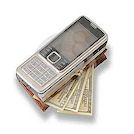By MARTIN EKPEKE

Late last year, the central bank of Nigeria (CBN) issued license to 16 operators to operate mobile money transaction in Nigeria so as to transform the manner by which Nigerians make payments for their business transactions via mobile phone platforms.
Those that were issued provisional licenses include Banks like Stanbic IBTC, Ecobank, Fortis MFB, UBA/Afripay, GT Bank/MTN and some Non-bank like Pagatech, Paycom, M-Kudi, Chams, Eartholeum, ETranzact, Parkway, Monitiz , FET and Corporeti. The licenses are provisional and that a number of milestones must be achieved in order to be able to proceed with offering the service.
With only 22 million bank accounts and less than 10,000 bank branches mostly operational in urban and semi urban centres, leaving those in the rural area unbanked, mobile payment would be able to cater for the 80 million mobile subscribers in Nigeria out of the 150 million populations including those that have no access to formal financial services, which is key to the new mobile money growth in Africa after the success it recorded in Kenya with Mpesa.
The Central Bank of Nigeria appears to have done a good job by placing emphasis on security of mobile payment systems via a “Regulatory Framework for Mobile Payments Services in Nigeria” which was released in June 2009. The financial regulatory document appears to be good, but it has not provided sanctions for defaulters as a result it cannot ensure high level of security compliance in its present form.
Most banks are already engaged in mobile banking, though very elementary, various forms of SMS transaction alerts and balance enquiries are aspects of mobile banking. Most banks have not paid much attention to security and the problems are already beginning to crop up. Some banks and a lot of their clients think that mobile alerts are harmless but they are as wrong as they could be, a simple plain mobile alert from a financial institution has the potential of adversely affecting the client and the bank.
The Standard SMS that are used for everyday messaging are not secure. It is only few people that realize it is highly vulnerable at many points. On the handset where someone can easily gain access to it, on the air interface (between the handset and the BTS), there are now devices that cost less than 1,000 USD that could be used to sniff messages (SMS) over the air without gaining direct access to the user’s cell phone and at the mobile operator’s network where it is stored as a plain text file which could be read by the network operator’s staff.
Since standard SMS can be compromised very easily, it is not suitable for handling sensitive or confidential messaging which the financial industry deals with. When transmitting sensitive mobile financial information like PINs, account balances and other sensitive information, security should be of utmost importance to prevent fraudsters from gaining access to customers’ accounts and making unauthorized transactions using the customers’ details. If mobile banking and payment security is treated with levity, the problems that the financial industry will face will make ATM related fraud seem very trivial.
Bayero Agabi, an ICT journalist believes mobile money transaction are always easy to compromise even when the owner of the platform tell you that it is security proof, and the most painful part is responsibility of the money lost still rest on the recipient of that money. He also raised concern over the electronic bill that is still at the national assembly, which has not been pass into law yet, so if there is a compromise or someone at the bank compromises your PIN, it is your responsibility, even if you go to court, you will not get justice.
Quality of services has also been seen as criteria to the success of mobile payment in Nigeria, high quality networks must be available everywhere for mobile payment system to work in Nigeria.
According to the Chairman of Telecom Group, Dr. Emmanuel Ekuwem “If the network is poor or there is corruption and interference, or the receiving party is not able to receive the money when he needs it, then that will impair the quality of the transaction and discourage the users from coming on board the mobile money platform.” So network operators must give high quality services which are extremely important for the users.

































